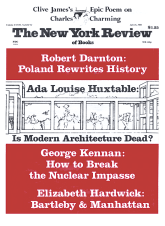NIGHT DESCENDED ON US WITH A CHILL
For Marina Kedrova
Night descended on us with a chill.
The low-roofed and soot-blackened archways
Looked onto ten stations as well
As ten parks, or more, sunk in November—
That settlement, circle, or zone
Where on the blind brickhouse wanders
A moving one-hundred watt beam:
In the labyrinth, mentor and escort.
Temporarily we make our home
In the kingdom of Ariadne and Minos.
Because of the fog and the gloom
For hours not a single plane takes off.
Every day again all trains are jammed—
How much space, how much air and unhappiness.
So those prisoners who returned home
Sometimes longed for the eye of the cell-guard.
Like a debt repaid to the void
Some familiar places stood opened:
I repeated inside my head: “bus,
University, monument, island.”
I said: “Tomorrow I’ll go,
I’ll go or at least I’ll try to.”
And along the hither world’s brow
My soul hurried on into limbo.
Old addresses grew suddenly near.
The alphabet changed form and meaning.
Voices grew faint and dead, I could hear,
Unable to find us two in either
This house’s locked-up, empty cell
Where the paintings don’t recognize me,
Nor in dreams, nor in heaven, nor even
Dante’s second circle of hell.
Thus time is stopped; to be exact,
One ceases existence gradually.
It’s just that each year, in effect,
You hear the phone ring more remotely,
And memory, day after day,
Shifts diameter like a compass
Till the past’s a straight line on the page,
First pretending to turn into distance.
What you hear and see, I can’t tell,
In reality chipped from reality.
The paved banks of Acheron withheld
The unfelt swell. Each nullity
Is separate, all on its own.
And the world lives its life without us.
There exist, in the end, alone
Dead silence and the nine muses.
Where the capital slowly revolves,
And the snow’s games make us weary,
Where the fog hides all objects’ selves,
Thank God for the dictionary.
In the kingdom where a friend’s hand
Will never hurry to help you,
The void or the supreme power
Sends the angel—rhythm and language.
I ask not one moment’s respite,
Neither death, nor forgiveness for sinning
—Only leave the primordial drumming
Over stone and the ice of the night.
NEL MEZZO DEL CAMMIN DI NOSTRA VITA
To the memory of Konstantin Bogatyrev
My middle years had overtaken me.
I lived, but studied only non-existence.
Death was for me one of the family,
Took nearly all the space in my apartment.
By stages I had even trained it, so
I’d ask it not to touch me, keep its distance.
I’d see each morning what for all I know
Is Eastern Europe’s most exquisite city,
Where iron waits to come into its own,
In gloom the reeds, decaying softly, rustle,
With knuckleduster, locomotive, stone,
Or in, perhaps, the best of cases—petrol.
I slept and drank and ate all inside death.
I tried to give it purpose and some meaning.
Forgot it sometimes. Getting used to it
Is almost too hard for a human being.
I turned the key that barred the corridor.
My heart beat raggedly, weighed down my breast.
It’s true: within the confines of this state
Death even, sometimes, was an accident.
Note: Konstantin Bogatyrev, the Russian translator of Rilke and a close friend of Tomas Venclova, was violently murdered, as far as is known, by KGB agents in Moscow in 1976 (see “Why Kostya Had to Die,” Index on Censorship, vol. 6, no. 2, March-April 1977, pp. 47-51). The most exquisite city is Vilnius. The reeds, knuckleduster, locomotive, stone, petrol all refer to types of death met by Venclova’s friends.
This Issue
July 16, 1981



